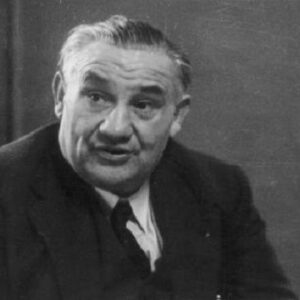Ernest Bevin was a British politician, leader of a trade union, and statesman. He was a member of the Labour Party and helped start the Transport and General Workers’ Union. From 1922 to 1940, he was the general secretary of the union. As Clement Atlee’s foreign secretary, he was a key part of making decisions about Britain’s foreign policy after World War II. His childhood was very hard and sad because he lost his parents when he was eight years old and had to quit school to take care of himself by working in places that didn’t offer any hope for the future. He started working as a laborer when he was 11 and later joined the Dockers’ Union. After that, he became the secretary of the Dockers’ Union and got into politics through the Bristol Socialist Society. After losing several general elections, he finally joined the government in 1940, when Winston Churchill was in charge. He was made Minister for Labour and National Service, and he did a good job during his time there. After the Second World War, he did a lot to help the government get financial and military aid. He also made it easier for trade unions to negotiate their terms of agreement by giving them a better place to stand.
Early years and childhood
Ernest Bevin was born in the English county of Somerset on March 9, 1881. His mother was named Diana Bevin, and no one knows who his father was. After his mother died in 1889, he lived in poverty for the rest of his childhood.
He went to school for a short time and then quit in 1892.
Ernest Bevin’s Career
Ernest Bevin worked as a laborer and then as a driver of a mineral-water truck in Bristol in 1892. He joined the Dockers’ Union and the Bristol Socialist Society got him interested in politics.
He was the secretary of the Dockers’ Union from 1910 to 1921. From 1914 on, he was also a national organizer. In 1922, when the Transport and General Workers Union (TGWU) was created, he was a very important part of it.
Soon after, he was chosen as the general secretary of the TGWU. This made him one of the most important labor leaders in the country and a strong supporter of workers in the Labour Party.
In the general elections of 1918 and 1931, he ran as a Labour Party candidate from the Bristol Central and Gateshead constituencies, but he lost both times.
During the 1930s, he pushed for Britain to get more weapons and have a strong foreign policy. He was against fascism. In 1935, his speech against George Lansbury was so bad that Lansbury resigned and Clement Attlee became the leader of the Party.
The Emergency Powers (Defense) Act, which was passed in 1939, gave him a lot of power over the workforce and made it easier for trade unions to negotiate after the war.
During World War II, Winston Churchill put together a government with people from all different parties in 1940, and he made Bevin the Minister of Labor and National Service. Since Bevin had never been an MP before, he was elected as an MP from the Wandsworth Central constituency without any opposition.
During the war, he put nearly 48,000 soldiers (called “Bevin Boys”) to work in the coal industry. He also made sure that working-class people were paid better and had better places to live.
In 1945, the Labour Party’s Clement Attlee put together a government, and Bevin was named Foreign Secretary.
Britain was on the verge of going bankrupt after World War II, so Bevin got a low-interest $3.75 billion loan from the US. He signed the Dunkirk Treaty and the Brussels Pact so that Europe could have a single military alliance. This made it possible for NATO to be formed in 1949.
In 1946, Attlee and Bevin were criticized heavily for wanting to make an atomic bomb. The ministers who would have been against it because of how much it would cost were not invited to the last meeting in 1947.
After the Mandate of Palestine was over in 1948, the State of Israel was made. Bevin didn’t handle the situation as well as everyone thought he would, and the separation wasn’t peaceful. Hundreds of thousands of people had to leave their homes.
In 1948, he worked out a deal with Iraq called the Portsmouth Treaty. Under this agreement, the British stayed in charge of Iraq’s foreign affairs, and Iraq had to get military supplies and training from the British.
He quit on March 9, 1951, and for a short time that same year, he was the Lord Privy Seal.
Works of note
Ernest Bevin is known for helping to start the Transport and General Workers Union. From 1922 to 1940, he led the group as its founder and General Secretary.
As Clement Atlee’s foreign secretary, he was a key part in making decisions about Britain’s foreign policy after World War II. He was an important part of making NATO and making Britain a strong ally of the US during the Cold War.
Personal History and Legacies
Ernest Bevin’s personal life is not well known, but we do know that he was married and had a daughter.
He died on April 14, 1951.
Jewish terrorist groups planned to kill Ernest Bevin in 1946, according to declassified intelligence files.
Estimated Net worth
Unknown.


